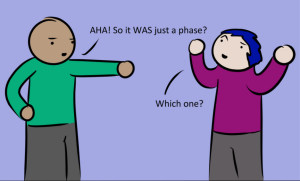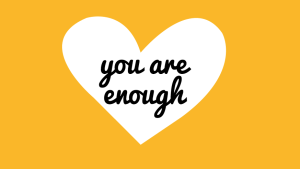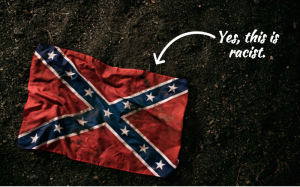Internalized misogyny, by definition, is sexism turned inward toward ourselves and outward toward other women.
It becomes innate as we are socialized to the norms of our culture that indicate, overtly and covertly, that women are less than men – less worthy, less strong, less dependable, less able, less of a leader, less logical – while also more than men: more emotional, more irrational, more complex, more to manage.
This defines our roles, who or what we can or cannot become, who we should be or become.
It is the implementation of cruel limitation based on cultural baggage.
It takes hold on the playground, graduates to the work place, and proceeds to inform our interactions – both with ourselves and with the full spectrum of a/genders we encounter.
As women, we encounter microaggressions – those almost-ignorable comments or actions that dismiss or downplay people based on interpreted anatomy and identity – that happen constantly in most work environments.
They show up in the sexual overtones of a touch or a comment, an offhanded reference to child-bearing status (from period to parenthood), or simply offered, verbally or through gestures, an implied “there there, my dear.”
And, as if to add insult to injury, these aren’t wielded solely from our male colleagues. Woman on woman misogyny is rampant – after all, social conditioning is delivered to everyone.
As the target, it can leave us feeling helpless and incapable, wondering why we ever crawled out of the trees.
That’s why it’s important to begin to understand how internalized misogyny shows up in ourselves and others; it’s the first step in dismantling it. From there we can explore some things that can help us recognize and change it.
Since my own perspective is my best teacher and example, allow me to elaborate…
My Own Experience
I was on the phone, again, with the manager for my new professional development contract I had won in a competitive bid process. I was to be the trainer for a two-day experience. She was asking questions, more like interrogating me, about the content of the training curriculum I had been hired to develop and present.
It seemed to me that she was almost attacking the details, as if she thought I was less than qualified, as if my material wasn’t good enough.
“I do this for a living,” I remember thinking. “It’s not my first rodeo. What does she think she’s doing?”
Still, I listened and took notes. She wanted to be clear that I understood the audience, that the material wasn’t too low or too high for where this group had come from and where they wanted to go.
I understood that – it was explained in the competitive application I had completed and won.
Simultaneously, I welcomed the learning opportunity and wanted to take the information to heart. I pride myself on my ability to adapt my program and language to meet the needs of the client.
I was just really frustrated with her apparent lack of belief in my expertise and ability. Her challenge sort of surprised me. So did my frustration.
I started to wonder, what if I was a man?
After the phone call and over a glass of wine, I reflected on what had happened. I began to realize a few things:
1. I knew that I had won the contract over a national expert, a male national expert.
2. I was sure if she had been talking with him, she would not have said things in the same way, potentially even spoken them at all.
3. I also was bolstering my own now-bruised ego, having felt a wave of self-doubt about my ability to fulfill my obligation. She had rattled my cage.
As I ran these things through my head, I realized I was confronted with a layer of internalized misogyny. This contract manager – another woman – was dealing with me quite differently than she would if I were a man.
Quite probably, if my name was Leon instead of Leah, this conversation would never have happened. She probably would have said little to nothing, allowing Leon to move forward with the program as accepted. Did I mention they had the full program as part of the proposal that won me the contract?
Me As An ‘Expert?’
I considered the “national expert” notion.
I thought about the male colleague I had beaten out for the contract. I looked at the evidence, what he had and did compared to what I had and did. They were dead even, sometimes I was even more, better, bigger. Sometimes it was a little different.
I suddenly recognized that I am an industry expert.
I had never considered it before. In fact, as I looked at my behavior, I realized I also have succumbed to internalized misogyny.
For my male colleague, the national scene has been easy. He rose to the top and accepted the label “expert” flawlessly, as if he had been born to it.
I, on the other hand, have had to work pretty hard to get the same air-time, the same media attention, the same attention from the upper management of our industry – yet, I have not been quick to embrace the label as “expert.”
Indeed, I have often found myself denouncing it.
As a woman, I often feel as if the expectation is to be “humble.” Which basically means smiling and shaking our head when complimented for the skills and performance we have worked hard to achieve, dismissing them as if they are nothing out of the ordinary – even when we know they are not!
I could feel the internalized message to my bones, “I have to be humble.”
Even as an industry leader, if I forget my humble beginnings I am quickly labeled with the “b” word – and it isn’t the “boss.”
I thought of the recent training where a participant approached with a question. The individual started with, “I thought since you were the expert, I’d ask your opinion.”
My response? “No, I’m not really an expert, just good at what I do.”
As I looked at this I realized, I am acting on the internalized messages I have come to understand regarding misogyny as a businesswoman, as had the contract manager.
All of the messages of “not good enough” flooded in. I recognized how much I had taken in that idea that in order to be good enough, never mind being the expert, I had to be more.
To be seen and recognized as the expert I am, I have to be more, do more, show more, write more, be humble, and never get to claim my status.
It was that moment that I changed how I “did” myself as a businesswoman. I now embrace my expert status. I use the word to describe myself, call out my skills, credentials and abilities clearly. I am no less humble, I just acquiesce less.
To my surprise, I saw the difference in the response from people in just one training.
As I embraced the idea of myself as an expert, as was clear by the evidence, the very woman who had started this thought process for me, the contract manager, suddenly began treating me differently.
She asked questions and accepted my answers as valid. She lost the interrogation style and began to engage in a conversational manner, problem solving as necessary to ensure the needs of all the participants were met. It felt respectful, collegial.
By the end of a two-day event after I had embraced my expert status, I had droves of people seeking answers and opinions from me, where previously the numbers had been one or two. I accepted their title as expert, appreciatively, but clearly.
When Is It Bad to Be Smart?
I remember a job interview where I had specifically been invited to apply. When the woman called to invite me, she admitted I was a bit over-qualified for the position, but because she had reviewed my application and noted that I didn’t hold the credentials they wanted for the other job for which I had applied, she thought this one would be a good fit, maybe until I secured my credentials.
I agreed and progressed from the first to the second interview.
The second interview was a panel, three men and three women. One of the women was the Director with whom I had spoken and the others her deputies. As part of the interview, we were to provide a 5-minute training. This is my strong point.
The overall interview seemed to go well, with most of the panel smiling and nodding in my direction. I did note one gentleman who seemed a bit uncomfortable with the depth of my answer.
He asked clarifying questions, almost as if he were asking for his own interest. I answered easily and basically enjoyed myself.
I left eager to hear back that I had secured the job. It was several weeks later when the call came. The voice on the other end, the same woman who had invited me to apply, was hesitant, sounding a bit baffled herself.
“I’m afraid you were not one of the candidates hired.”
I felt a blow to my stomach. “Can I offer some feedback?” she queried. I agreed.
“The panel felt you wouldn’t be able to take criticism or direction well and that you are not able to meet people where they are, that you aren’t a team player.”
This was devastating. The things she identified are primary tenets in my life, personally and professionally. I have had plenty of feedback that those are characteristics and qualities I possess and use well.
“What did they base their opinion on, if I can ask?”
“You were very clear that you love to provide professional development training and, when you talked about it, you only talked about it as “I.” Also, when you responded to questions you never asked if what you had said made any sense to them.”
I reflected, but said nothing except, “Well thank you for the feedback.” And hung up.
I immediately turned to my professional community, providing the feedback I had just gotten and asking for clarity – was this an accurate reflection of me that I just didn’t see?
My colleagues and friends quickly rallied, assuring me I was wonderful. It was a male colleague, however, who really brought it home for me.
“You were too smart and confident and, no offense, but that’s hard for people to take when it comes from a woman. That woman did everything but call you arrogant.”
There it was: internalized misogyny. The administrator who invited me to apply was now the vehicle of that internalized misogyny – whether by her own prejudice or succumbing to the prejudice of one of her deputies – either way, it cost me a job.
Of course, if that was the mindset, I wouldn’t have done well in the position. Perhaps a reality, but not really a comfort in the moment. I reflected.
I am smart, a strong and effective communicator, a very capable leader, and can make difficult and team-centered decisions in urgent situations to name a few. These are seldom identified as good traits for a woman among my male counterparts and those women who perhaps unwittingly ascribe to the rules of misogyny.
Such characteristics are certainly unappreciated as positive employee behavior by those providing opportunities, contracts, and paychecks.
Part of the problem, as identified by more than one of my bosses, is that I’m smart and I know it. They never stated out loud the real problem, however; I’m a woman and I’m smart, I know it, and I act on it.
Whose Idea Is It Anyway – And Does It Matter?
Another skill I was proud of when working with men in positions of power was my ability to convince them of my concept or proposal was their idea. I often compared this to the talent I have working with horses, some of which require the same tactic.
Somehow it isn’t possible that little ol’ me could come up with any great ideas on my own. Every successful woman, after all, brings coffee to her boss, right?
I hear my own voice in my ears when I know what I have to say will not shine kindly on a male colleague. I consider, deeply, how to say it in a way that might be heard. It usually ends up as a question, “Would it be better to consider it this way.”
When my male counterpart then picks up the idea, the boys in the room are quick to join in – the same ones who remained silent when I raised the concept.
This is one more way the lies that make up misogyny have crept into my own mind, of how internalized misogyny shows up for me. I reinforce the idea that somehow, because of my gender, I can’t have an original thought, let alone one that is of good enough quality to actually make it to the boardroom floor.
I have learned to not overthink myself. When I have something to say, I say it, regardless of who is in the room. I’m not disrespectful or in any way flippant. I just say my piece and, if necessary, fight for the right to move forward with my proposal or idea or thought.
The results have been mixed.
As an entrepreneur who now is also perceived as an expert (wink, wink – nailed that one) I have more credibility with all my colleagues. That doesn’t guarantee carte blanche.
There are times I confront the dismissal that I feel is based on my gender. I am known to challenge others to consider if a male colleague in the room had said it, how might they have heard it. Again, met with mixed reviews, but it is making progress, small changes in my world.
Now What?
I have begun extending outside my current circle of influence to provide my work and services across a larger and larger audience, competing openly with my male counterparts in the industry, using my awareness of internalized misogyny as a foundation to create new relationships, honest ones.
In some cases, it has led to challenging conversations and the learning curve can be steep – I still backslide on occasion, but I quickly recover. The outcomes have been mixed, save one: I’m happy with who I am in doing business and in how well I am doing in business.
I stepped into my own power and have begun carefully listening to my guiding inner voice.
Any time there is a snag – a heavy feeling in the pit in my stomach or unsettling in my mind – I know there is another potential lie I have applied that doesn’t resonate with me.
This internal navigation system provides me the opportunity to dig down to those internalized messages of misogyny (and other -isms) and challenge them, find new behaviors and new beliefs on which to ground. My personal navigation system provides me with the awareness that begins the work to change my behaviors.
It leads to meaningful conversations with the full spectrum of genders and it leads to learning and growing for us all. There are many of us struggling with these issues of internalized misogyny and a lot of us want to change it for ourselves and others. It looks different for each of us and the conversations are eye opening for us all.
But it starts with me.
It starts with you.
I’ll bet you have one too, an internal navigation system. I’m sure it can serve you as well as mine serves me. Maybe you already use it. Maybe today is the day you learned that you should go look for it.
That’s how we change this world, this idea of internalized misogyny: together, individually, one message at a time. I invite you to join me.
[do_widget id=’text-101′]
Leah R. Kyaio co-owns and operates With Respect, LLC, creating strengths-based solutions for violence and oppression. Her work includes professional and organizational development, team-focused consultant work, individual coaching for front line to executive personnel, and systems analysis and restructuring. To learn more about how it all comes together, visit her website.
Search our 3000+ articles!
Read our articles about:
Our online racial justice training
Used by hundreds of universities, non-profits, and businesses.
Click to learn more





















